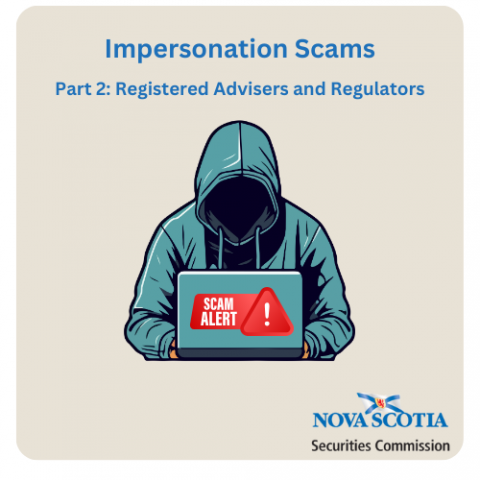Submitted by nsscadmin on

We’re back with the second part in our short series looking at impersonation scams. Last week we looked at rich and famous impersonation scams. This week we’ll look at impersonation scams where fraudsters are impersonating registered advisors or securities regulators.
In August, 2023 the North American Securities Administrators Association issued an investor advisory on impersonation scams involving registered advisors. In this type of scam, a fraudster will impersonate a registered advisor to steal someone’s money or personal information. They often do so by sending unsolicited emails or cold calls offering investment advisory services. These emails will often include photos of the actual person as well as some personal information the fraudster found online.
Most of the information in these unsolicited emails or pitches will match information found on the real person’s registration info or their personal website or social media. One thing that will be different will be the contact information, including the email address they are using to send you the pitch. The fraudster will not include the real person’s actual contact information because they do not want you contacting them. If you are thinking about replying to an unsolicited message from a registered individual, ensure that the message you’ve received is actually from them and the person you are contacting is who they say they are.
Fraudsters are also running impersonation scams claiming to be representatives from securities regulators. The Canadian Securities Administrators (CSA) has issued multiple alerts about this (here and here), and so has the Financial and Consumer Services Commission of New Brunswick (here).
These fraudsters impersonating regulatory staff, try to obtain money or personal information via email or text message. This could be a recovery room scam where they claim to be able to recover money lost to a previous scam for a fee. Regulators will never ask for money from the public to conduct any inquiries, investigations or recover money. The fraudster posing as a regulator may claim they are attempting to collect a fine that remains unpaid or collect personal information as part of an investigation.
Be extremely cautious if anyone posing as a staff member of a regulator asks you for money or personal information.
Do not click any links that appear in emails from someone posing as staff from a regulator.
Check the email that the message has originally come from. Does it appear to be from a legitimate regulator’s address? If not, forward the email to staff at that regulator for investigation.
If you are suspicious about any type of communications you receive, contact the regulators directly with your questions and concerns.
